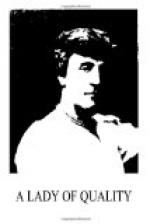“My lady must beguile you to be less formal with us,” said Dunstanwolde. And later her ladyship spoke as her husband had privately desired: “My lord would be made greatly happy if your Grace would honour our house oftener,” she said one night, when at the end of a great ball he was bidding her adieu.
Osmonde’s deep eye met hers gently and held it. “My Lord Dunstanwolde is always gracious and warm of heart to his kinsman,” he replied. “Do not let him think me discourteous or ungrateful. In truth, your ladyship, I am neither the one nor the other.”
The eyes of each gazed into the other’s steadfastly and gravely. The Duke of Osmonde thought of Juno’s as he looked at hers; they were of such velvet, and held such fathomless deeps.
“Your Grace is not so free as lesser men,” Clorinda said. “You cannot come and go as you would.”
“No,” he answered gravely, “I cannot, as I would.”
And this was all.
It having been known by all the world that, despite her beauty and her conquests, Mistress Clorinda Wildairs had not smiled with great favour upon Sir John Oxon in the country, it was not wondered at or made any matter of gossip that the Countess of Dunstanwolde was but little familiar with him and saw him but rarely at her house in town.
Once or twice he had appeared there, it is true, at my Lord Dunstanwolde’s instance, but my lady herself scarce seemed to see him after her first courtesies as hostess were over.
“You never smiled on him, my love,” Dunstanwolde said to his wife. “You bore yourself towards him but cavalierly, as was your ladyship’s way—with all but one poor servant,” tenderly; “but he was one of the many who followed in your train, and if these gay young fellows stay away, ’twill be said that I keep them at a distance because I am afraid of their youth and gallantry. I would not have it fancied that I was so ungrateful as to presume upon your goodness and not leave to you your freedom.”




